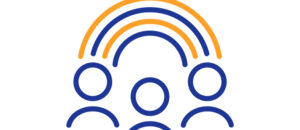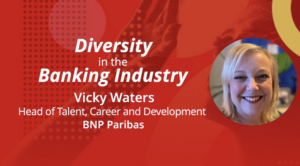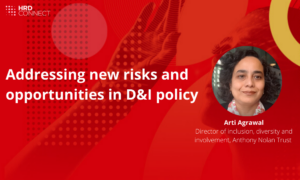Now is the time: changing assumptions to build sustainable DEI
- 6 Min Read
HR luminary Dave Ulrich argues that making sustainable progress in DEI is a noble hope, and realistic expectations focus on traceable progress on specific concerns.
- Author: Dave Ulrich
- Date published: Jan 11, 2021
- Categories

Recently, issues around social justice as evidenced in diversity, equity, and inclusion (DEI) have become ever more prevalent. The call for engaging in DEI initiatives shows up with tragic events that highlight racial strife (e.g., George Floyd and Breonna Taylor incidents in the United States), in numerous protests and proclamations on the need for change in DEI, and immigration and refugee challenges around the world (e.g., Brexit).
The onset of these events leads to clarion calls that suggest that now is the time (how Martin Luther King began his unforgettable I have a dream speech) for real progress in social justice.
DEI is not a new topic and there are many current issues that have been raised relative to DEI agenda (see Figure 1).
The emerging DEI agenda needs to move beyond calls for action to sustainable results in finding ways to manage diverse candidates into leadership positions, to have honest and sensitive conversations on social justice issues, and to turn social consciousness desires into productive conversations and sustainable actions.
Figure 1
Issues Related to Diversity, Equity, and Inclusion (DEI)
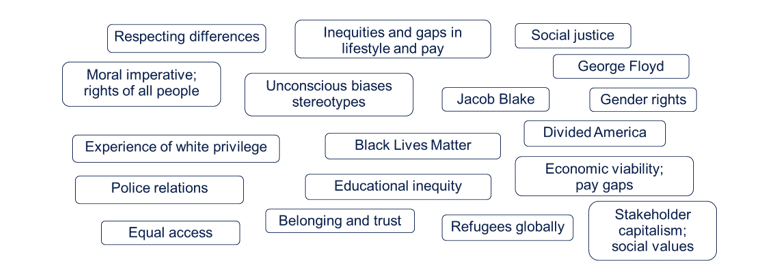
These well-intended efforts for DEI progress can be put into four phases (Figure 2).
Figure 2:
Evolution of DEI Agenda
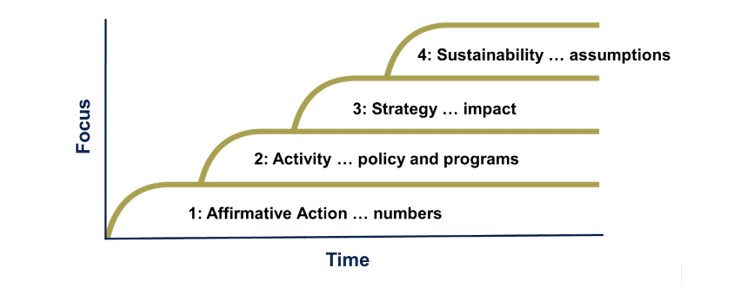
To reach these aspirational results, DEI efforts need to move beyond affirmative action scorecards that track numbers; DEI activities, policies, and programs that are isolated events; and even the strategic relevance of DEI efforts. To be sustainable, DEI efforts have to address fundamental and often unexplored assumptions that need to evolve and then embed new behaviors that support new DEI assumptions.
Emerging DEI Assumptions
To move from well-intended, but isolated, events to sustained patterns requires exploration of fundamental assumptions. The famous psychologist Kurt Lewin said “nothing is as useful as a good theory.” A theory explores underlying assumptions and examines root causes to an issue such as diversity.
Figure 3 illustrates three levels of understanding and why assumptions are so important. Aspen trees (the most widespread tree in North America) are visible above the ground just as the experiences and evidence cited above demonstrate racial and ethnic challenges in society.
Just like Aspen trees have an extensive rhizomatic root system, the causes of racism are complex. And, just like the Aspen trees draw resources from the soil, the underlying assumptions of racism need to be explored to try to create sustainable change. Without focusing on underlying assumptions, well-intended training programs, communications, or hiring practices are more likely to become isolated events, not sustained patterns.
Figure 3:
Three Levels of Understanding DEI Challenges

Often, organizations operate out of an assumption of power. Organizations allocate power based on hierarchical position. Through power assumptions, scarce resources are allocated and decisions made, often resulting in winners and losers. The power assumptions about DEI lead to allocating scarce organizational resources like positions, training, and salary to individuals.
Empowerment operates out of a different set of assumptions. As indicated in Figure 4, power focuses on the action; empowerment focuses on potential and opportunity; power allocates fixed resources; empowerment generates new opportunities.
An empowerment set of assumptions for DEI work encourages opportunity for all. Empowerment assumptions create a psychological safety net that combines DEI initiatives into a connected root system that sustains positive change.
Figure 4
Evolving Assumptions about DEI
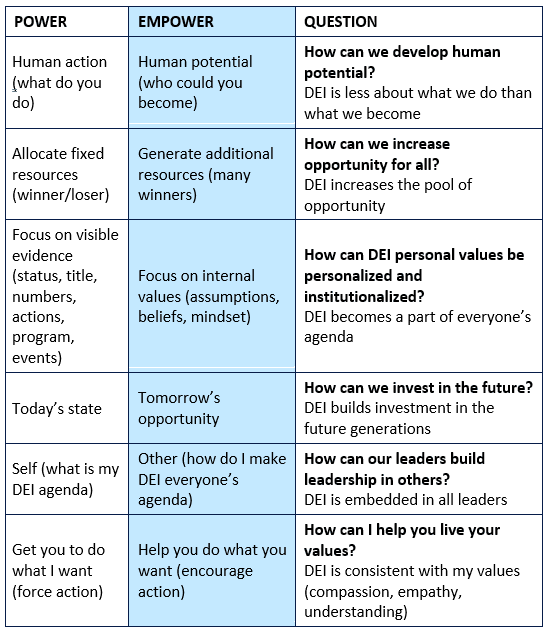
Behaviors to support empowerment assumptions
To move DEI from events to sustainable change, the assumptions of empowering opportunities need to be evident in a host of specific behaviors. Figure 5 suggests four levels of behavioral change, starting with self-reflection of each individual to recognize unconscious biases and the extent to which those biases shape beliefs and actions.
Few would ever claim to be a racist, yet we all have to honestly face the reality that we are shaped by our experiences with likely include biases. Individual actions move to the leadership team where behaviors should reflect empowerment assumptions when talking about and framing diversity discussions.
The leadership team then creates an organization identity that reflects an organization’s public commitment to empowerment assumptions. Finally, these individual, team, and organizational commitments become sustainable through a disciplined change process.
Figure 5:
Levels of Behavioral Change
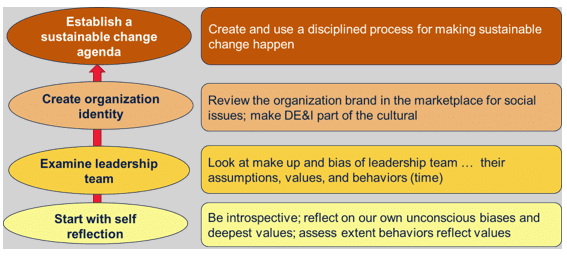
We have done extensive work on creating a sustainable change agenda for any organizational initiative and have identified seven steps to help make change last (see Figure 6). Having the discipline to apply these seven steps to change helps institutionalize and sustain the DEI agenda.
Figure 6:
Institutionalizing a DEI Change Agenda
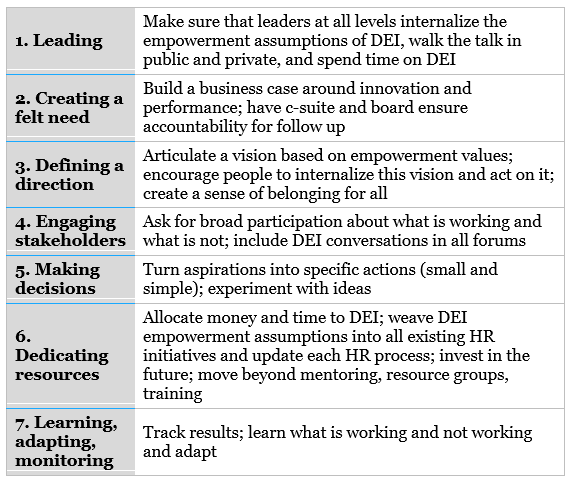
Few would disagree that treating all people with respect through DEI efforts is a noble aspiration. Also few would disagree that much more progress needs to be done to move beyond events to sustained change. And, few would disagree that sustained change on DEI progress is easy.
DEI conclusion
Sustained progress on DEI efforts is possible through adopting empowerment assumptions about human potential, seeking opportunity more than allocating resources and doing the keys to successful change listed in Figure 6.
In the 1960s, Martin Luther King called for open access for Blacks to restrooms and restaurants, genuine rights to vote and lead, and seats on busses and in classrooms. Hopefully, the current unrest will prompt further change and more widespread opportunity. But progress is a verb.
Making sustainable progress on DEI is a noble hope, and realistic expectations focus on traceable progress on specific concerns.
In his letter from the Birmingham Jail, Dr. King wrote:
Injustice anywhere is a threat to justice everywhere. We are caught in an inescapable network of mutuality, tied in a single garment of destiny. Whatever affects one directly, affects all indirectly. Never again can we afford to live with the narrow, provincial “outside agitator” idea
He concluded this remarkable call to action with the words:
I hope this letter finds you strong in the faith. I also hope that circumstances will soon make it possible for me to meet each of you, not as an integrationist or a civil-rights leader but as a fellow clergyman and a Christian brother.
Let us all hope that the dark clouds of racial prejudice will soon pass away and the deep fog of misunderstanding will be lifted from our fear drenched communities, and in some not too distant tomorrow the radiant stars of love and brotherhood will shine over our great nation with all their scintillating beauty.
Yours for the cause of Peace and Brotherhood, Martin Luther King, Jr.



